From the Moon to Mars: The British Library Science Fiction Classics by Mike Ashley
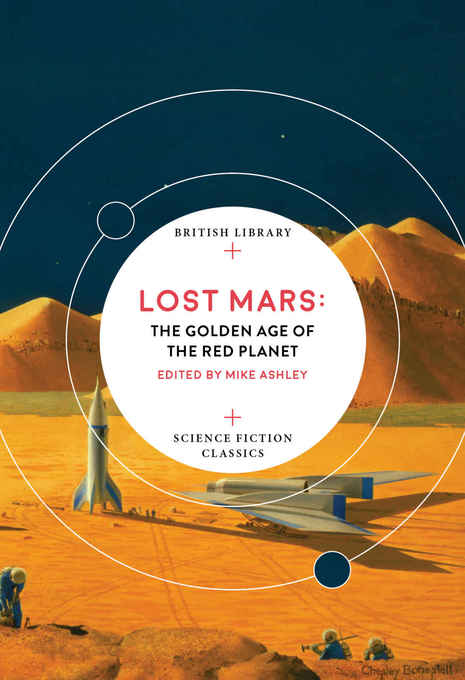 |
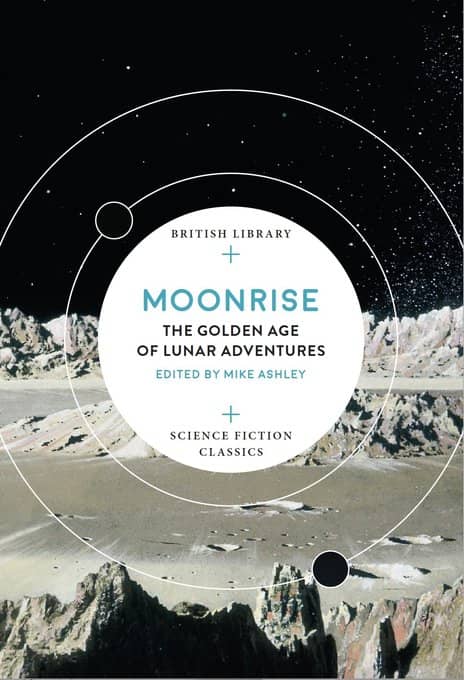 |
The Moon and Mars have fascinated science fiction writers for generations, although I thought the era of classic Mars and Moon anthologies was over. But it turns out that’s not the case. At least not while editor Mike Ashley is on the job, anyway.
Lost Mars: The Golden Age of the Red Planet, which collects pulp-era tales (and pre pulp-era tales) from Wonder Stories, Amazing Stories, Astounding, and Worlds of If, was published in April 2018. Its sister anthology Moonrise: The Golden Era of Lunar Adventures, with stories from F&SF, Amazing, Tales of Wonder, Astounding, New Worlds, and Fantastic, arrives in September. Both are part of the British Library Science Fiction Classics, which I’ve never heard of, but for which I immediately have a deep and passionate love. Near as I can figure out, it’s a relatively new imprint devoted to early 20th Century SF. Or maybe just stories of Mars and the Moon, I dunno. But either way, love love love.
These are very welcome books. They include tales of adventure and exploration from the pre-spaceflight era (the most recent stories are from 1963, only two years after the start of the Apollo space program), which means they’re not particularly concerned with getting the science right. Scientific verisimilitude was the province of late 20th Century SF; these stories concern themselves chiefly with imagination and adventure.
And when it comes to the Moon and Mars, human imagination has been pretty darn fertile. These books contain some of the greatest SF ever written, including Arthur C. Clarke’s brilliant tale “The Sentinel,” which inspired 2001: A Space Odyssey, and Stanley G. Weinbaum’s groundbreaking “A Martian Odyssey,” which Isaac Asimov said, “had the effect on the field of an exploding grenade. With this single story, Weinbaum was instantly recognized as the world’s best living science fiction writer.” There’s also a Martian Chronicles tale by Ray Bradbury, an excerpt from H.G. Wells’ classic First Men in the Moon, and stories by Walter M. Miller Jr, J. G. Ballard, Gordon R. Dickson, Edmond Hamilton, John Wyndham, E. C. Tubb, and many others.
[Cick the images for Mars-sized versions.]
If you’re going to celebrate the Moon and Mars, there’s a lot of great fiction to choose from. Many of the stories Ashley selects were cover stories from the pulps and science fiction digests. I understand it’s a Black Gate tradition to include gratuitous magazine covers, so here’s a sampling, featuring tales by SF masters Gordon Dickson, Edmond Hamilton, John Wyndham, and J.G. Ballard.
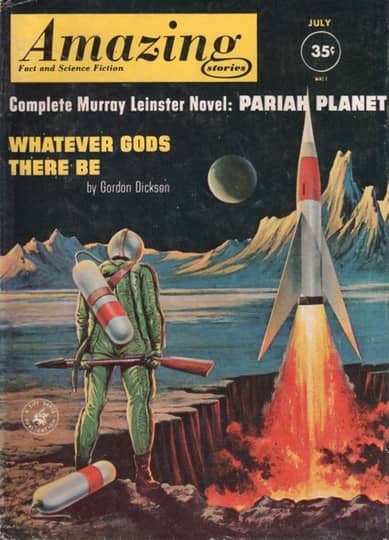 |
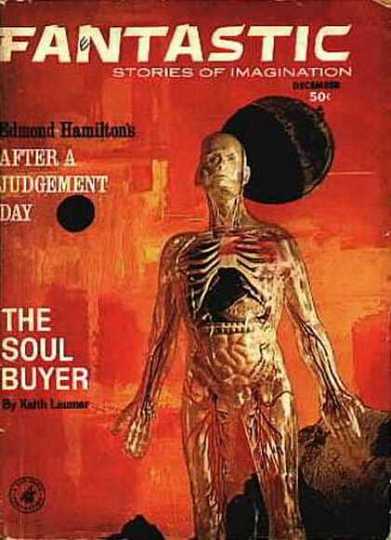 |
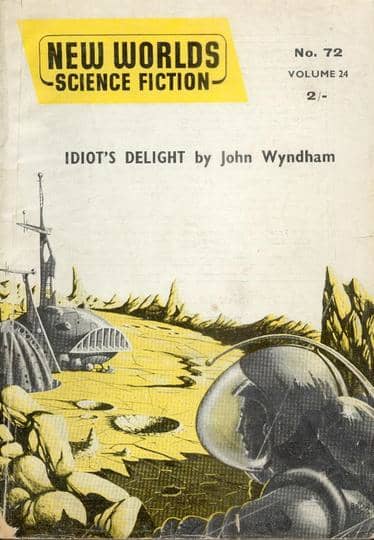 |
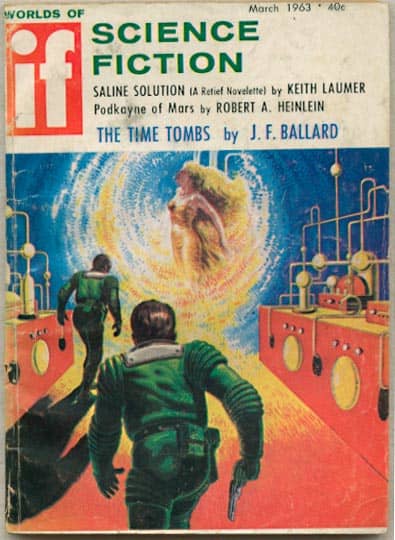 |
Another thing I love about these books is that they include both acknowledged classics and neglected gems. I’m not nearly as well read as Rich Horton or Steven Silver, so there’s plenty here that’s new to me, which is delightful.
Here’s the Table of Contents for Lost Mars.
“The Crystal Egg” by H. G. Wells (The New Review, May 1897)
“Letters from Mars” by W. S. Lach-Szyrma (1887)
“The Great Sacrifice” by Geo. C. Wallis (1903)
“The Forgotten Man of Space” by P. Schuyler Miller (Wonder Stories, April 1933)
“A Martian Odyssey” by Stanley G. Weinbaum (Wonder Stories, July 1934)
“Ylla” by Ray Bradbury (Maclean’s, January 1950)
“Measureless to Man” by Marion Zimmer Bradley (Amazing Stories, December 1962)
“Without Bugles” by E. C. Tubb (New Worlds #13, January 1952)
“Crucifixus Etiam” by Walter M. Miller, Jr. (Astounding Science Fiction, February 1953)
“The Time-Tombs” by J. G. Ballard (If, March 1963)
And Moonrise, on sale September 1.
“Dead Centre” by Judith Merril (The Magazine of Fantasy and Science Fiction, November 1954)
“A Visit to the Moon” by George Griffith (Pearson’s Magazine, January 1900)
“Sunrise on the Moon” by John Munro (Cassell’s Family Magazine, October 1894)
First Men in the Moon (excerpt) by H. G. Wells (The Strand Magazine, serialized December 1900 — August 1901)
“Sub-Satellite” by Charles Cloukey (Amazing Stories, March 1928)
“Lunar Lilliput” by William F. Temple (Tales of Wonder #2, March 1938)
“Nothing Happens on the Moon” by Paul Ernst (Astounding Science-Fiction, February 1939)
“Whatever Gods There Be” by Gordon R. Dickson (Amazing Stories, July 1961)
“Idiot’s Delight” by John Wyndham (New Worlds Science Fiction #72, June 1958)
“After a Judgement Day” by Edmond Hamilton (Fantastic Stories of Imagination, December 1963)
“The Sentinel” by Arthur C. Clarke (10 Story Fantasy, Spring 1951)
I’m such a sucker for these books that I immediately went looking for more titles in the British Library of Science Fiction Classics. I found two, both reprints of long out-of-print novels by William F. Temple. Bet they’d look great on my bookshelf next to the Ashley books.
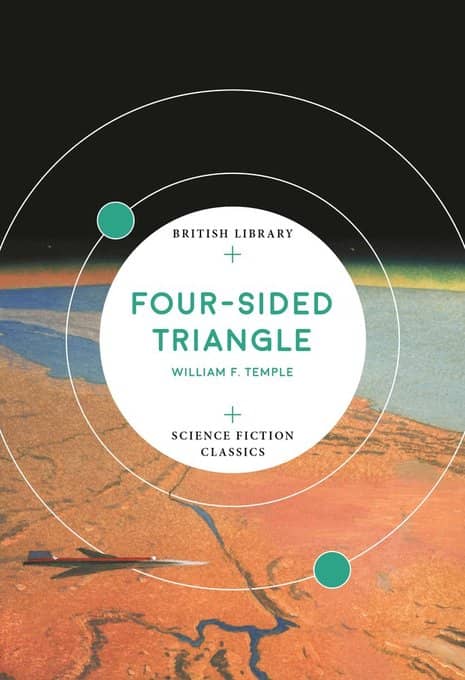 |
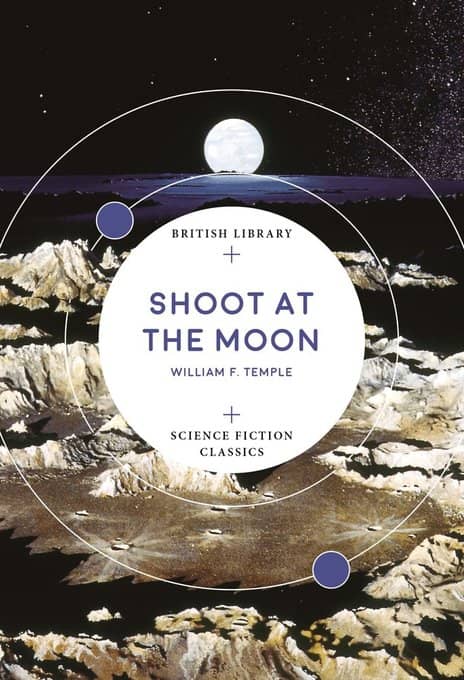 |
All four of these books were published in the UK, although they’re readily available here in the U.S. The University of Chicago Press is reprinting Lost Mars in a handsome US edition later this year; I have no idea what plans they may have for the other titles.
Todd McAulty published four novellas in the print version of Black Gate, including “There’s a Hole in October” and “The Haunting of Cold Harbour.” His first novel The Robots of Gotham was published in hardcover by Houghton Mifflin Harcourt in June. Learn more at HauntedStars.com.
These look great. I’d not heard of the British Library Science Fiction Classics Library either, but I’m familiar with the British Library series of golden age mysteries.
I’m not sure why, after several readings over several decades, the Weinbaum is still so revered. Other than that, a fine line-up, though I say that without remembering them all.
In a funny coincidence, just this morning I pulled two novels by Arthur C. Clarke of the shelf to read: A Fall of Moondust and The Sands of Mars
I’d seen Mike Ashley’s collection, “From the Depths, and Other Strange Tales of the Sea” mentioned here a couple weeks ago, and got a copy last week. It’s published by the same British Library, but part of a ‘Tales of the Weird’ program (4 more titles of same listed in the back of the book). The only name I recognized in the Table of Contents was William Hope Hodgson. I’ll definitely look into the titles you list above.
R.K. — I haven’t read those early Clarke books, although I really enjoy his short fiction from that era. Do you recommend them for a modern audience?
smitty59 — I forgot all about that. I should have realized there’s a Tales From the Weird imprint. I shall investigate!
A fall of Moondust and Clarke’s other lunar novel, Earthlight, are still terrific books; the outdated science barely hurts them at all. A Fall of Moondust, especially, is a race-against-time story that’s absolutely gripping in an “Apollo 13” kind of way.
I covet them both, especially MOONRISE, because it has a rare reprint of Judith Merril’s “Dead Center” (original spelling), which I haven’t read, but I know it was in BEST AMERICAN SHORT STORIES—a rare honor.
Love those covers.
Thomas — I’ve very much enjoyed your long essays here. You should do one on Arthur C. Clarke. Your one-sentence review of both books has made me interested in them for the first time in decades.
Dolphin — I think “Dead Center” was also in THE BEST OF JUDITH MERRIL, and of course the big NESFA collection, HOMECALLING.
Joe — I know exactly what you mean.
Todd, I’ll let you know here after I’read them. I’ve had to re-glue the pages on A FALL OF MOONDUST and it’s in the press now.